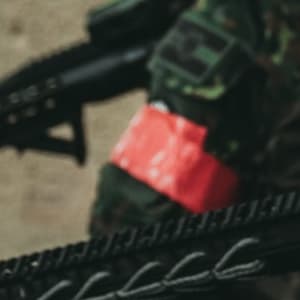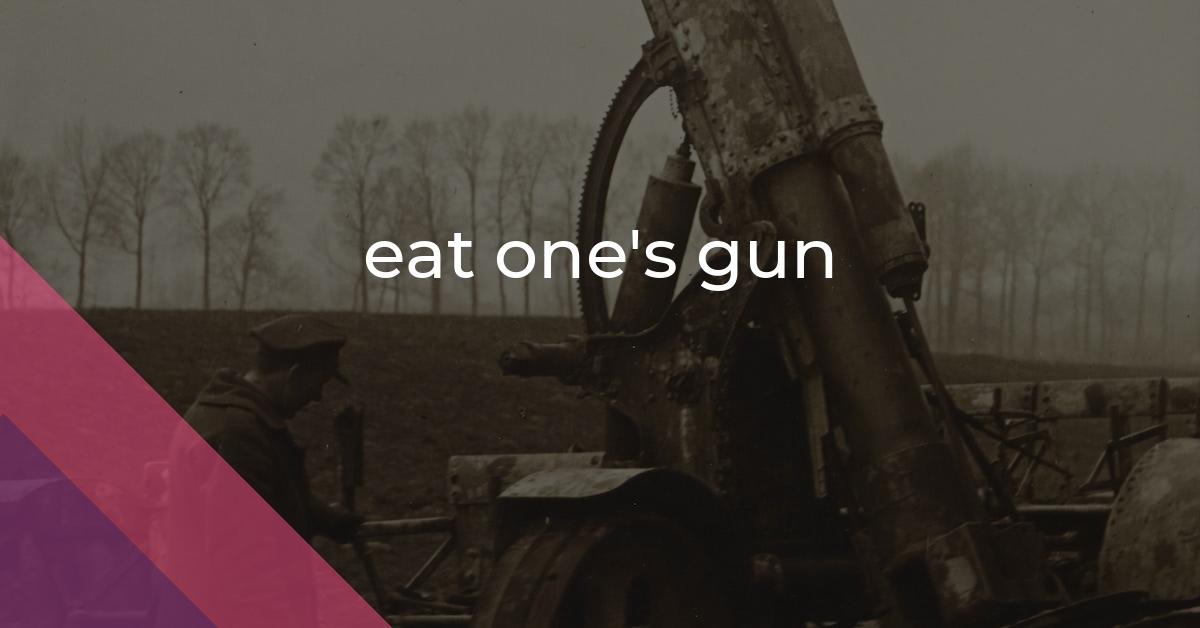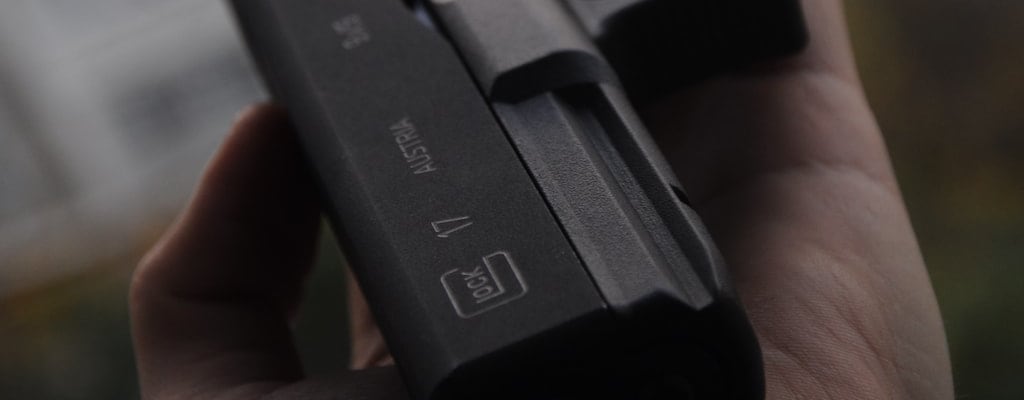eat one’s gun: Idiom Meaning and Origin
What does ‘eat one's gun’ mean?
The idiom "eat one's gun" is an extreme figurative expression that refers to the act of committing suicide by shooting oneself with a gun. It signifies utter desperation or hopelessness in a person's life.

Idiom Explorer
The idiom "I could eat a horse" means to be extremely hungry, indicating that one's appetite is so intense that they could consume a large amount of food, even as much as an entire horse.
The idiom "guns blazing" means to engage in a task or activity with great determination, energy, and enthusiasm.
The meaning of the idiom *gun jumping* is to act prematurely or make assumptions without having all the necessary information. It is often used in legal and business contexts when someone takes actions or makes decisions without properly considering the consequences.
The idiom "give it the gun" means to apply maximum effort or speed to a task or activity.
The idiom "for one's life" means doing something urgently or desperately to avoid harm, danger, or death.
The idiom "fire in anger" means to shoot a weapon or discharge ammunition with the intention of causing harm or expressing frustration and hostility.
The idiom "fight for one's life" means to struggle with all one's effort and determination to survive or overcome a life-threatening situation or serious challenge.
The idiom "fall on one's sword" is used to describe taking responsibility for a mistake or failure, often by sacrificing oneself or accepting blame.
The idiom "eat one's feelings" means to cope with emotions or stress by indulging in comfort food or excessive eating, as a way of temporarily relieving emotional pain or distress.
Deciphering the Imminent Final Act
The idiom "eat one's young" is a related idiom that shares a similar figurative meaning to "eat one's gun." This idiom is used to describe someone who destroys or harms their own offspring, whether through neglect, abuse, or some other form of harm.
Similarly, the idiom "eat one's feelings" is another related expression that conveys the idea of using food as a coping mechanism or emotional escape. It suggests that someone is consuming food as a way to numb or distract themselves from their emotions.
On the other hand, the idiom "shoot one's load" has a different connotation. While it can be interpreted literally as expending all of one's ammunition, it can also be used metaphorically to describe someone who has exhausted their energy or resources in a particular task or endeavor.
All three of these idioms, including "eat one's gun," highlight the complexities of human emotions and the different ways in which people cope with their struggles and challenges.
Eat one's gun is an idiom that is commonly used in American English. The exact origin of this idiom is unclear, but it is believed to have originated in the early 20th century. The idiom is a metaphorical expression that describes a situation where someone is so despondent or hopeless that they consider or attempt suicide.
The idiom "eat one's gun" can also be expressed in different forms, such as "bite one's gun" or "pull the trigger." These variations share the same meaning and are used interchangeably in various contexts.
The idiom typically implies a feeling of utter despair and hopelessness. It is often associated with individuals who are facing extreme emotional or psychological distress. The origin of the idiom may be related to the act of using a gun as a means of self-harm or suicide.
Despite its dark connotations, "eat one's gun" is commonly used in casual conversations and popular culture, often in a figurative sense. It is used to emphasize extreme dissatisfaction or frustration with a situation. In these contexts, the idiom is not meant to be taken literally, but rather as an exaggerated expression of discontent or defeat.
The idiom "eat one's young" is a related idiom that shares a similar figurative meaning to "eat one's gun." This idiom is used to describe someone who destroys or harms their own offspring, whether through neglect, abuse, or some other form of harm.
The idiom "eat one's feelings" is another related expression that conveys the idea of using food as a coping mechanism or emotional escape. It suggests that someone is consuming food as a way to numb or distract themselves from their emotions.
The idiom "shoot one's load" has a different connotation. While it can be interpreted literally as expending all of one's ammunition, it can also be used metaphorically to describe someone who has exhausted their energy or resources in a particular task or endeavor.
All three of these idioms, including "eat one's gun," highlight the complexities of human emotions and the different ways in which people cope with their struggles and challenges.
It is important to note that the idiom "eat one's gun" carries a strong negative connotation and may be considered offensive or triggering to some individuals. Its usage should be approached with caution and sensitivity, particularly in discussions surrounding mental health or suicide.
Overall, the idiom "eat one's gun" encapsulates the depths of despair and hopelessness that can drive someone to contemplate or attempt suicide. While the exact origin of the idiom remains a mystery, its usage in contemporary language reflects its enduring relevance in describing extreme emotional distress.
Example usage
Examples of how the idiom *eat one's gun* can be used in a sentence:
- After losing all his money in the stock market, John felt so desperate that he was considering eating his gun.
- The main character in the novel reaches a point where he believes there is no hope left and contemplates eating his gun.
- In the movie, the detective finds himself in a dilemma and decides to eat his gun rather than face the consequences.
The idiom *eat one's gun* typically conveys a sense of extreme despair or hopelessness where someone contemplates suicide by shooting themselves. The phrase is a metaphorical expression and should not be taken literally. It is important to note that using this idiom can be sensitive and potentially triggering for some individuals, so it is advised to exercise caution and empathy when discussing or using such expressions.
More "Suicide" idioms



